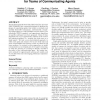Free Online Productivity Tools
i2Speak
i2Symbol
i2OCR
iTex2Img
iWeb2Print
iWeb2Shot
i2Type
iPdf2Split
iPdf2Merge
i2Bopomofo
i2Arabic
i2Style
i2Image
i2PDF
iLatex2Rtf
Sci2ools
123
click to vote
ATAL
2006
Springer
2006
Springer
Decentralized planning under uncertainty for teams of communicating agents
Decentralized partially observable Markov decision processes (DEC-POMDPs) form a general framework for planning for groups of cooperating agents that inhabit a stochastic and partially observable environment. Unfortunately, computing optimal plans in a DEC-POMDP has been shown to be intractable (NEXP-complete), and approximate algorithms for specific subclasses have been proposed. Many of these algorithms rely on an (approximate) solution of the centralized planning problem (i.e., treating the whole team as a single agent). We take a more decentralized approach, in which each agent only reasons over its own local state and some uncontrollable state features, which are shared by all team members. In contrast to other approaches, we model communication as an integral part of the agent's reasoning, in which the meaning of a message is directly encoded in the policy of the communicating agent. We explore iterative methods for approximately solving such models, and we conclude with so...
Algorithms | ATAL 2006 | Centralized Planning Problem | Intelligent Agents | Observable Markov Decision |
Related Content
| Added | 20 Aug 2010 |
| Updated | 20 Aug 2010 |
| Type | Conference |
| Year | 2006 |
| Where | ATAL |
| Authors | Matthijs T. J. Spaan, Geoffrey J. Gordon, Nikos A. Vlassis |
Comments (0)

